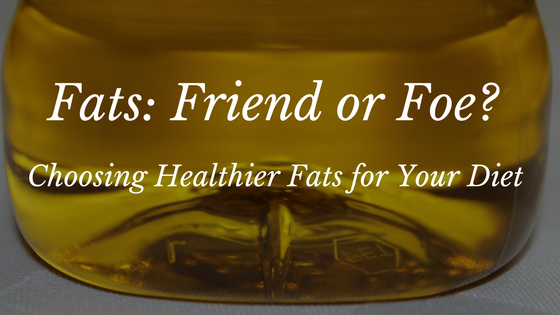Fats, friend or foe?
There’s a war raging in the world of nutrition over that question.
Yet, we’re the ones left in fat limbo trying to decide who’s right.
Understand this, all fat is NOT created equal!
What we do know, is that we need fat in our diet. Fat is one of the three critical macronutrients; along with protein and carbohydrates.
The problem comes in understanding that some fats are super-health-boosting; while others are super-health-busting.
Health-building fats support your brain, hormones, immune system, heart health, and moods. Health-busting fats pretty much bust all of these (brain, hormones, immune system, heart health, and moods).
It is important for each of us to understand the information we’re receiving so that you can make the best choices for you and your family.
As a rule, fats from whole foods that are the least processed will be the healthiest for you.
But, you already knew that, right?
Here’s my list of fats that are healthy for you and the ones to ditch…
Health-boosting fats
Health-boosting fats are from:
- Nuts and seeds (hemp, flax, and chia)
- Fish
- Seaweed
- Pasture-raised/grass-fed animals/eggs
- Olives
- Avocados
I love “virgin” oils, and here’s why. Getting the oil out of a whole food involves some processing. Sometimes it’s by squeezing, or heating. Other times it’s by using chemical solvents. The word “virgin” is used to show minimal processing (and no solvents!).
According to the World Health Organization’s Codex Alimentarius:
“Virgin fats and oils are edible vegetable fats, and oils obtained, without altering the nature of the oil, by mechanical procedures, e.g., expelling or pressing, and the application of heat only. They may be purified by washing with water, settling, filtering and centrifuging only.”
For example, Extra virgin olive oil must:
- Be cold pressed
- Not contain any refined olive oil
- Possess superior quality based on chemical composition and sensory characteristics.
Don’t you think these standards ensure higher quality? I sure do!
Plus, the minimal processing helps to maintain some of the quality of delicate fat molecules, as well as their antioxidants. Win-win! And, you can actually taste the richness in these oils.
My oils of choice are avocado, olive and coconut oil. Read your labels to make sure that you are buying the finest oils and not oils that have been blended with some of the following health-busting fats. Yes, they really do that – so, consumer beware.
Health-busting fats
Health-busting fats are from:
- Seed and vegetable oils like safflower, soybean, and corn oils
- Hydrogenated and partially hydrogenated
Hydrogenated oils are particularly bad; this is because they contain smaller amounts of “trans” fats. Studies show that trans fats lead to insulin resistance, inflammation, belly fat. They also drastically raise the risk of heart disease. Lose-lose!
Don’t forget, we’re not just talking about buying bottles of these fats for home cooking. We’re also looking at the processed foods that contain them. You must learn to read the ingredient labels to understand how these health-busting fats are getting into your diet.
How to get more health-building fats
First, you have my permission to ditch any foods in your cupboards that contain safflower oil, soybean oil, corn oil, or any hydrogenated oil. Soybean oil alone accounts for over 75% of oils consumed by Americans, so it’s pretty popular in the “non-health food” department.
Second, try substituting one of the health-building oils whenever you have a recipe that calls for the other stuff. Try flax oil in your salad dressing, avocado and/or olive oil in your cooking, and coconut oil in your baking.
Third, make healthier versions of your go-to processed foods. I’ll help you out now with my super-simple mayonnaise recipe below. It’s way better for you than the unrefrigerated stuff you find at your grocery store.
Now tell me: What’s your kitchen fat of choice and why? Let me know in the comments below.
Health Boosting Mayonnaise
Ingredients
- 1 Large Egg - Organic
- 2 tsp Lemon Juice
- 1/2 tsp Natural Sea Salt
- 1 tsp Dijon Mustard
- 1 Clove Garlic
- 1 Cup Olive Oil - Cold Press Organic
Instructions
- Add all ingredients except the olive oil to your food processor. Process until creamy (about 10 seconds).With the food processor running, add a few drops of oil into the egg mixture. Every few seconds add a few more drops. Continue until the mixture starts to thicken.Now you can do a slow drizzle. Stop pouring, every once in a while checking that the oil gets fully incorporated.Store leftovers in a covered container in the fridge for up to 1-2 weeks.Serve & enjoy!
Recipe Photo Credit: Stacy Spensley
References:
http://www.precisionnutrition.com/all-about-healthy-fats
https://authoritynutrition.com/extra-virgin-olive-oil/
